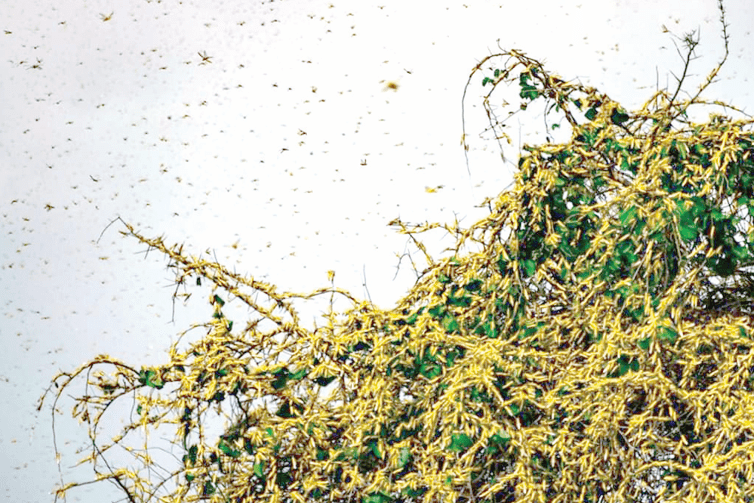Kenya, IGAD nations lost Sh52b to desert locusts
By George.Kebaso and Precious Nyongesa, July 30, 2024Kenya is among several countries in the Intergovernmental Authority on Development (IGAD) which lost over Sh52 billion ($400 million) following the desert locust invasion, largely attributed to the slow response by the authorities and their development partners.
Signs of an outbreak were there as early as mid-2019, according to the Desert Locust Control Organisation (DLCO) office, but slow action and poor mobilisation of resources hampered approach towards prevention. The full-blown invasion of vegetation by the desert locust was announced in early 2020, shortly before the outbreak of Covid-19 in Kenya.
Moses Mwesigwa, Director, DLCO for Eastern Africa said that invasion, whereas informed by climate change and instability in some parts of the region and other places where the desert locusts could not be controlled in time.
“While member states, development and regional organizations swung into action to address the invasion, it was already late, and it cost more than Sh52 million ($400m) to solve a problem that could have cost just Sh400 million ($3m) if it could have been averted and solved at the grassroots level,” noted Mwesigwa.
Locust invasion
According to Mwesigwa in August 2019, the regional crop monitoring network in Eastern Africa first highlighted concerns about a developing desert locust invasion in parts of northern Ethiopia and coastal Sudan. This, he said, was published in the Eastern Africa Crop Monitor, the December 2019 edition and in several monthly Food Security and Nutrition Working Group (FSNWG) statements.
To demonstrate that the signs of an outbreak were there, Mwesigwa said that the FSNWG in December 2019 issued an Alert on the Severe Desert Locust Outbreak that was threatening rural food security and livelihoods across Eastern Africa.
“The two networks made of agriculture monitoring national institutions and food security analysts continued to raise early concerns that the desert locust, which is not new to parts of the region, was invading the Eastern Africa region in exceptionally large swarms like never seen before,” he said, noting that however, the delayed response necessitated the quick spread and invasion aided by strong easterly winds.
He said that DLCO tries to address the problem at the breeding grounds in each season, and the reason the office always encourages member countries to improve on their local capacities so that they address the problem at the source.
“Continued surveillance, monitoring and control are highly recommended in order to avert the likely negative impacts of this upsurge,” he said, saying DLCO has all the information regarding the migratory pests.
Quelea birds
However, currently, the DLCO is monitoring the quelea birds’ problem already in parts of Ethiopia, Kenya, Tanzania, Somalia, and also in parts of eastern Uganda. “So we keep monitoring, and that’s why data sharing and information is very critical, so that each of the countries can know what to expect in the next season or in the next cycle,” he said, as representatives of three frontline countries of Djibouti, Ethiopia and Somalia held a four-day high-level meeting on mitigating food insecurity through trans-boundary pest control in Kenya last week.
This also comes at a time the region is dealing with an armyworm which is also a serious pest within the region. “In order to avoid the scenario that saw the IGAD region lose close to half a billion US dollars due to the desert locust invasion of 2020, three frontline countries have come together to find the best ways of addressing the transboundary pest migration,” he said.
He pointed out that frontline countries are where the breeding of these migratory pests takes place, especially desert locusts. “You will notice that migratory pests don’t need passports to cross at the borders, so we believe when these three countries mitigate the effects then the rest of the countries in the region will be safe,” he said.
Migratory infestations
According to experts, the region remains at high risk of desert locusts and other migratory infestations and invasions due to climate change hence the need for increased vigilance in preparedness and surveillance to increase early warning actions.
IGAD Food Security, Nutrition and Resilience Analysis Hub (IFRAH) Coordinator Abdi Fidar noted that the three countries are considered frontline countries when it comes to desert locusts specifically.
“So they came together to agree and build on what other countries and regional organizations have done to help solve the problem and mitigate the effect of these migratory pests,” added Fidar.
The major pests that migrate across the borders include the Desert Locusts, Quelea bird, and African and Fall Armyworms which cause significant damage to crops and pastures subsequently posing a serious threat to the region.
The recent pests’ outbreak was in 2019-2022 when IGAD says thousands of tonnes of crop and hectares of pasture were destroyed, impacting the region’s food security and the well-being of communities, especially pastoralists and subsistence farmers.
“There was also an environmental impact from pesticide usage. In Ethiopia 70% of the bees were destroyed at that time because of the use of pesticides and the environmental impact it had,” said Fidar, advocating for capacity as the most important factor in improving not only institutional capacity but also individual capacity.
“We need to use drones, satellite data and other cutting-edge facilities and techniques like Artificial intelligence, and machine learning so we are able to predict what’s coming; that’s why we are trying to improve the capacity,” said Fidar.
Desert locusts and other transboundary pests – Quelea birds, Fall Armyworm, African Armyworm, and Red Palm Weevil – are common serious threat to our Agri-food Systems, livelihoods, the environment and directly impacts on national food security of all IGAD member states.
